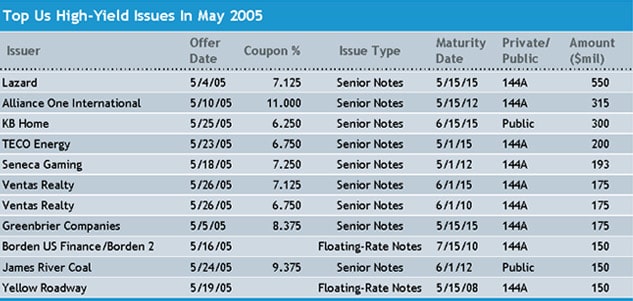Corporate Debt
Under the American Jobs Creation Act of 2004, signed into law by President George Bush last October, companies are allowed on a one-time basis to repatriate profits generated at overseas subsidiaries at a much lower than usual tax rate.
We believe that companies will use a substantial amount of repatriated profits to retire debt and address under-funded pension plans, says Edward B. Marrinan, head investment-grade strategist at JPMorgan Chase in New York.
The repatriated funds also will reduce future corporate borrowing requirements, he says.
According to a study conducted by JPMorgan, of the $354 billion after taxes that could be repatriated, $162 billion, or nearly half of the total, could be directed toward debt reduction.
The greatest beneficiaries of the new legislation will be multinational corporations in the pharmaceutical, technology, consumer-products and diversified industrial sectors, according to JPMorgan. These companies have the largest cumulative un-repatriated profits before 2003, and most enjoy substantial positive cash flows and cash balances, the study says.
Healthcare and pharmaceutical companies have the potential to reduce their debt by between $44 billion and $88 billion, depending on what proportion of the repatriated funds are used for this purpose, it says.
In January 2005, the US Internal Revenue Service, in conjunction with the Treasury Department, issued a notice that explicitly states that companies may use their repatriated earnings to pay down their debt.
In a second set of repatriation guidelines issued on May 10, 2005, the Treasury and IRS provided details on what dividends qualify for a deduction under the new legislation. A third notice will be released soon that will discuss the impact of repatriation on a corporations computation of its tax liability.
Once the guidelines are clear, analysts expect companies to begin the process of repatriating funds for a variety of purposes, including debt repayment.
We have already seen some of this type of activity, says Margo L. Cook, head of institutional fixed-income management at BNY Asset Management, Bank of
New Yorks investment management division. This implies that spreads will be well-behaved and that there may even be some tightening, she adds.
Nonetheless, there still will be a healthy supply of new corporate bonds coming into the market, Cook says.
Repatriated funds can also be used for hiring and training workers, capital investment, research and development, certain mergers and acquisitions within the US, advertising and marketing, and other activities.
Before repatriating the earnings, a company must have a domestic reinvestment plan for these funds that is approved by the companys CEO or president and is subsequently approved by its board.

Gordon Platt



